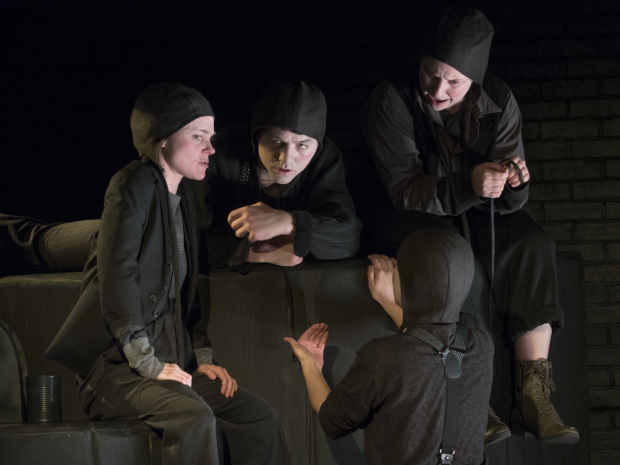
(© Pavel Antonov)
When Sidney Kingsley's drama Dead End debuted on Broadway in 1935, it was reflecting a poverty-stricken New York City that was just outside the theater doors. Eight decades removed, there's less immediacy in the play that gave us the iconic gang of "Bowery Boys," but the current Axis Theatre revival, directed by Randy Sharp, leans into the grit, darkening its blacks and grays like a surreal snapshot of Depression-era Manhattan.
Perhaps it even implicates some of the harsh realities of modern life in the Big Apple, which is seeing the highest rates of homelessness since the Great Depression alongside a statewide child-poverty rate that is nearing 22 percent. The language of Dead End is thoroughly embedded in its period (a syntax suited for the suave Humphrey Bogart, who starred in the 1937 film). But the relentlessly dark aesthetic of Sharp's production — bare sets by Chad Yarborough and shadowy lighting by David Zeffren — hovers slightly above reality to allow your mind to wander beyond the literal milieu.
The ethereal atmosphere is heightened by Sharp's abstractly curated cast, featuring a group of fine actors dressed in designer Karl Ruckdeschel's uniforms of black hooded shirts and suspenders. A gang of four adolescent boys — none of which are played by adolescents and three of which are played by women — introduce us to life on the streets. There's T.B. (Lynn Mancinelli), a disease-ridden kid who talks a tough game about life in reform school; Spit (Regina Betancourt), who carries himself with an angry, head-down stubbornness; Milty (a beautifully sympathetic performance by Emily Kratter), the gang's innocent newbie who learns the ways of the street despite his good-hearted instincts; and Tommy (a confident Jon McCormick), the charming-but-arrogant leader of the pack who eventually finds himself cornered between his circumstances and the law.
And then there are the adults — though they carry themselves more like overgrown children, fighting the same conditions as the young street urchins. Gimpty (George Demas) is a down-on-his luck architect, while his childhood buddy Baby Face Martin (Brian Barnhart, taking on the role played by Bogart in the film), has found his way to fancy suits and piles of money through a life of crime.
Gimpty and Martin map out the two possible paths ahead of these young criminals-in-training, neither of which looks particularly appealing. While Demas plays Gimpty as a moral, yet defeated man of promise, Barnhart is almost crazed in his blind, ends-justify-the-means way of life. The only other performers who share his exaggerated manner are our young gang members, who rattle off dialogue with rhythmic precision, accompanied by Paul Carbonara's original music and an assortment of other creative sound effects to suggest the eerie New York streets.
It's a dramatic world Sharp has built for what is already a dark story, and it’s an engaging one in which to exist for an hour-and-a-half. There are times, however, when style gets in the way of emotional substance. Martin reconnects with an old flame and now prostitute, Francey (sweetly played by Katie Rose Summerfield), in a scene that would be heartbreaking if we could see a glimmer of the person inside his caricature of a hardened gangster. Martin's contentious run-in with his mother (played by Laurie Kilmartin) would be similarly wrenching if she didn't materialize like a ghost wearing her years of struggle like a walking cautionary tale. The gang of boys do the best job of striking a balance between affectation and empathy — particularly Kratter and McCormick, who develop a truly touching companionship as Milty and Tommy. These moments of camaraderie are the only silver lining in a hopelessly stark world — one that will always be part of our collective past, and unfortunately, may be part of our collective present.










